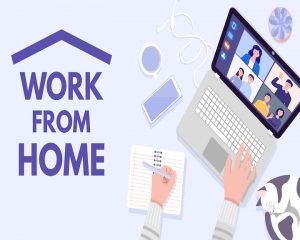All You Need to Know About WFH
Samantha Badr
Welcome back to another blog! In this installment of all things HR, I will be talking about the biggest drama of 2021 – working from home (WFH) versus working in the office.
In a time where it seems that everyone is WFH, it’s hard to picture life prior to the pandemic. According to the U.S. Bureau of Labor Statistics, in 2018, only 14% of employees worked from home five days a week. Two short years later, that number tripled. These days employees are able to work a full shift in their pajamas, but how long can this luxury last?
An employee survey conducted by leadership and communications consultancy, The Grossman Group, showed that 48% of employees working from home say they’d like to keep it that way. The consensus among family and friends is that WFH was the only positive of last year, further verifying these survey results. If staying at home wasn’t incentive enough, employees can save between $2,500 and $4,000 on travel expenses if they WFH. However, WFH is not for everyone. For some employees, it makes their job a bit harder. Collaborative projects leave employees relying heavily on technology to keep in touch with their co-workers. While some find that they can work better at home, it’s a distraction for others. If employees are too “laissez-faire” during the workday – it can leave them scrambling to finish their tasks at night, eliminating the barrier between work and home life.
Though the long-term effects of WFH are unknown, some employers are choosing to look on the bright side. In an interview with CNBC, CEO Mark Zuckerberg said that Facebook expects “up to half of their 48,000 employees to work remotely within five to ten years”. Facebook conducted an employee survey and found that many workers indicated an interest in WFH, and Zuckerberg saw the potential benefits of letting employees shift away from their offices. Even if employers are undecided on WFH, shifting to remote work can cut down on real estate costs. A typical employer can save about $11,000 a year for every person who works remotely even half of the time, according to Global Workplace Analytics. If companies can save money by downsizing their offices, they might begin to encourage employees to WFH.
Still, some employers do not agree with keeping WFH permanent. They fear that collaboration between employees suffers without face-to-face communication. Since WFH became a reality, company culture has shifted, and many companies had to find new ways to retain their employees. Another reason some employers do not back WFH is a lack of trust in their staff to complete tasks without supervision. A manager at a customer service agency might find that supervising their employees during the workday ensures they answer more phone calls.
The “Working from Home versus Working in the Office” debate has sparked discussions among employers and employees across the board. I recently had a conversation with two people that had differing opinions on WFH. I interviewed an HR professional, who said that the employees at her organization wanted to WFH, while their employer disagreed. The employees voiced their opinion to their manager, ensuring higher productivity and a safer environment if they WFH for the time being. However, their employer continues to mandate that they come into the office, even when corporate employees remain at home – leaving the rest of the staff very dissatisfied with management.
In another interview, the employees had the opposite viewpoint. They wanted to return to the office, but their boss wants them to WFH. This person had a job that required they have access to hundreds of classified documents. Unfortunately, these documents are in an archive in the main office. The employees are then forced to commute an hour just to obtain the documents they need. When they voiced their concerns to their employer, she stressed that their safety was her number one priority. Even though the staff is made up of only ten employees that have separate offices, their employer still didn’t budge.
Employers should be encouraged to let their employees find where they work best, whether it’s at the office or at home. Surveys say that employee satisfaction has increased or stayed the same since the pandemic started, so should employees have the choice to WFH? Even when offices fully re-open, a lot of employees might start asking to WFH or have partial remote work. If employers start mandating workers to come to the office, employees who are at high risk of contracting the virus may reach out to lawyers to fight their case. Regardless of the outcome – will organizations thrive, or suffer in the long run? Only time can tell.


